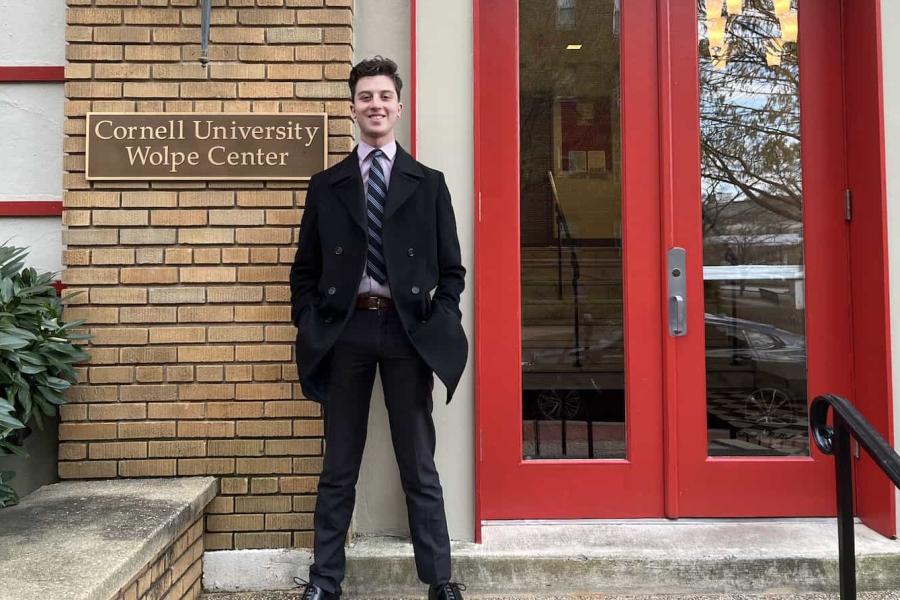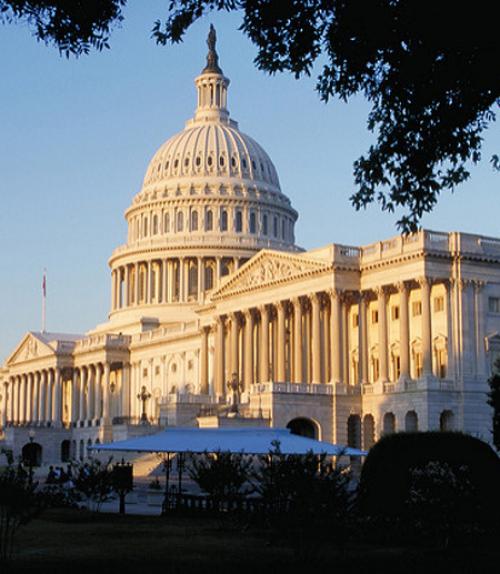Every semester — and over the summer — Cornellians have the opportunity to take courses and complete an internship in Washington, D.C. through the Cornell in Washington program, which is part of the Brooks School of Public Policy. Many students in the program come from the College of Arts & Sciences.
During the fall and spring semesters, students take a core course and two to three electives, do a research project and complete an internship. Students in the summer program only take one course and complete an optional internship. The program is headquartered at the Cornell University Wolpe Center, a building in Dupont Circle, near Embassy Row; students both live and take courses in the building.
A variety of courses are offered each semester, including Inquiry in Politics & Policy; Native Politics and the Nation-to-Nation Relationship; Political Journalism and American Defense Policy & Military History. Students have interned at both public and private sector entities around the capitol city, including CNN, the Supreme Court, the Environmental Protection Agency and the Council on Foreign Relations.
Aaron Friedman ’25, a government major in A&S, is taking part in the program this semester. He said he’s enjoying the experiential learning style of his courses on policy, journalism and lobbying.
“My professor for Strategic Advocacy has worked with George W. Bush, and he's always telling us stories about his time working in the White House,” Friedman said. “I think that the stories are providing food for thought. I think it’s great to look at history and understand the lessons that we can draw from history, but I think it's even more important to actually draw lessons from the industry in the last decade or so, and that's what I've really been getting in this program with these classes.”
Vivian Lewandowski ’25, an information science major in A&S, echoed these sentiments, saying that she likes the discussion focus of the classes.
“I feel like it's a lot more discussion than lecturing. That's been very important," Lewandowski said. "They also bring in a lot of guest speakers who are very prominent individuals within the government or other industries — we had a journalist come talk to us last week.”
Internships also prove to be a valuable part of Cornell in Washington, as a core benefit of the program is the ability to network with industry professionals at the highest level. The internships have been both eye-opening and valuable, Friedman and Lewandowski said. Friedman is interning at the Washington, D.C. branch of the law firm Greenberg Traurig, where he helps connect clients with government officials and agencies, while Lewandowski is a digital intern at the progressive nonprofit The Hub Project, where she works for the media team.
“I've worked a little bit in the nonprofit atmosphere back on campus,” Lewandowski said, “but this one is specifically more progressive and so I really wanted to gain some insight into that and I'm hoping it will give me a little bit more of an understanding about what I want to do in the future.”
For their research projects, each student must write three policy memos. Each memo is addressed to a person or entity — including officials and agencies at all levels of government, business leaders such as Elon Musk and other leaders such as Cornell President Martha Pollack — and must offer solutions for issues facing communities or businesses. Students partner with a residential tutor — who both works with them and performs residential advisor responsibilities — to develop these memos, focusing not only on the efficacy of potential solutions but also their practical, political and financial feasibility.
“It is extremely fulfilling to see a student develop their policymaking skills and build creative solutions to important issues facing the country,” said Andrés Castaño, a residential tutor. “I worked with a student a few years ago who wanted to replace police officers in schools with social workers, and we worked together to make sure the policy was both effective and possible. She spent a lot of time on it, and built a policy that both worked and could make it through bureaucracy.”
Of course, the Cornell in Washington program goes far beyond academics and career experiences. It provides interesting opportunities for students to tour Washington landmarks and explore the city and surrounding areas, including a tour of the Library of Congress, where students visit the rare artifacts collection.
“They had the actual original Declaration of Independence because the one that's on display in the National Archives is the second edition. The first edition only had John Hancock’s signature on it and so the guide pulled it out. It was just a room of 30 of us and the original Declaration of Independence,” Lewandowski said. “We were all very afraid to breathe.”
“The professor at the Library of Congress showed us this box within the Rare Books and Manuscripts room and the box had the contents of Abraham Lincoln’s pockets on the night that he was assassinated in the theater,” Friedman said.“So we saw that he actually had a Confederate bill within his pocket at the time when he was shot. The historian did not provide a reason as to why, but presumably it was because he wanted to keep a souvenir or memento from the Confederates. The fact that we saw that firsthand was really fascinating, something that I never would have expected to even see.”
Jonathan C. Mong is a communications assistant for the College of Arts & Sciences.






